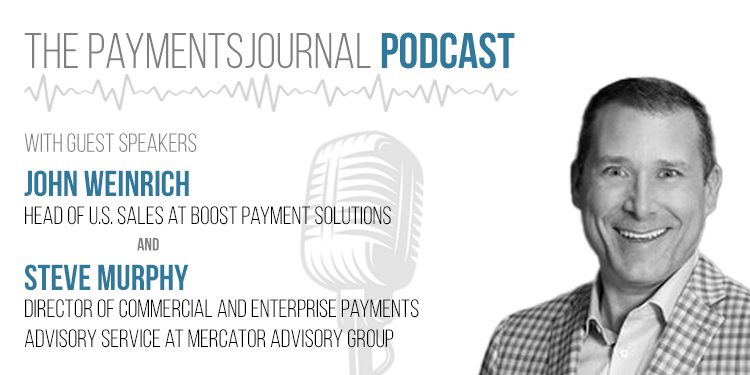The U.S. — and much of the world — is facing an inflationary environment not seen in more than 40 years. Persistent, high inflation is proving to be stubborn and shows no sign of slowing down. This greatly affects businesses buying goods and services because it increases their prices and makes running their business more costly. On the supplier side, any delay in receiving payment for a product from a business means that money is worth less when they receive it than when they submitted an invoice. The typical method of paper check in business-to-business (B2B) payments is less effective for all parties involved during times of inflation. These reasons are why commercial credit card payments are rising in popularity.
In September, PaymentsJournal sat with John Weinrich, Head of U.S. Sales at Boost Payment Solutions, and Steve Murphy, Director of Commercial and Enterprise Payments Advisory Service at Mercator Advisory Group.
Fast-Rising Inflation
Weinrich noted that not only is inflation very high, but it has risen very quickly, leaving many unprepared to deal with its consequences.
“Twelve to fourteen months ago, inflation was virtually nonexistent,” he observed. “Now we are dealing with the fastest-rising inflation in 50 years.”
This means that waiting for invoices to be paid by check can have devastating consequences for businesses — especially small businesses with limited working capital.
“When you have a DSO [Days Sales Outstanding, which is the number of days a company waits to get paid for a sale] of 90 days or so, that dollar is worth far less when you receive the payment than when you made the sale,” said Weinrich.
With borrowing costs high due to increasing interest rates, many companies cannot afford to take out a loan to covers costs while waiting to get paid. This makes getting paid on time vital to staying in business during tough economic times.
Commercial Credit Card Upswing
These factors are making businesses rethink their stance on accepting commercial credit cards for payments. By and large, businesses have resisted accepting credit cards for B2B payments due to the perceived expense of doing so and the technical cost associated with upgrading infrastructure to accept them. Historically, credit cards have typically been seen as a consumer payments mechanism, and large-scale B2B payments were not usually contemplated.
However, this is beginning to change.
“I keep hearing over the past couple of years since the pandemic that card acceptance has accelerated among businesses,” Murphy noted.
While acknowledging that widespread commercial credit card acceptance “still has a way to go,” Weinrich agreed that it is increasing in the B2B space. Typically, the cost of card acceptance was thought to outweigh the benefits, added Weinrich, but companies such as Boost that provide a technology platform that seamlessly enables commercial credit card payments are creating an environment where accepting credit card payments is more viable in the B2B environment.
One major benefit is straight-through processing (STP), which enables suppliers to get paid quickly and eliminates manual input and human involvement on both ends. The Boost STP platform, for example, automates the entire onboarding, credit card transaction, and reconciliation process for buyers and suppliers, thereby eliminating what is typically a cumbersome and manual process, Weinrich said.
“This guarantees timely, accurate payments and helps both the supplier and buyer manage their cash flows in this high inflationary environment we are in,” he added.
Boost also helps businesses manage regulatory costs and burden by eliminating the need for PCI reporting as this automated solution eliminates exposure to PCI data for the supplier.
Murphy also noted the decreased risk of attempted fraud associated with commercial credit card payments as opposed to check payments.
“I believe it is less than three percent,” he added.
Weinrich agreed, and noted that figure is low compared with other forms of payments. He cited data from the Association for Financial Professionals showing that attempted fraud activity for checks is at 66%, and 37% for ACH debits.
Increasing Awareness
Probably the biggest hurdle in commercial credit card acceptance in the B2B space is changing the long-held mentality around commercial credit cards.
“We’re asking businesses to try something new,” Weinrich said. “So, we in the payments space really need to put on our educator hat and tell them about the benefits. All businesses are looking to innovate and grow and reach their potential.”
Murphy noted that one trend that could help with the increase of acceptance of commercial credit cards is an increasing desire for both suppliers and buyers to use new payment methods. For buyers, this gives them flexibility in how to pay. And for suppliers, it helps reduce risk as well as attract new partners since they are offering multiple, flexible payment options.
“Right now is the perfect time for businesses to rethink their stance on card acceptance,” said Weinrich.










